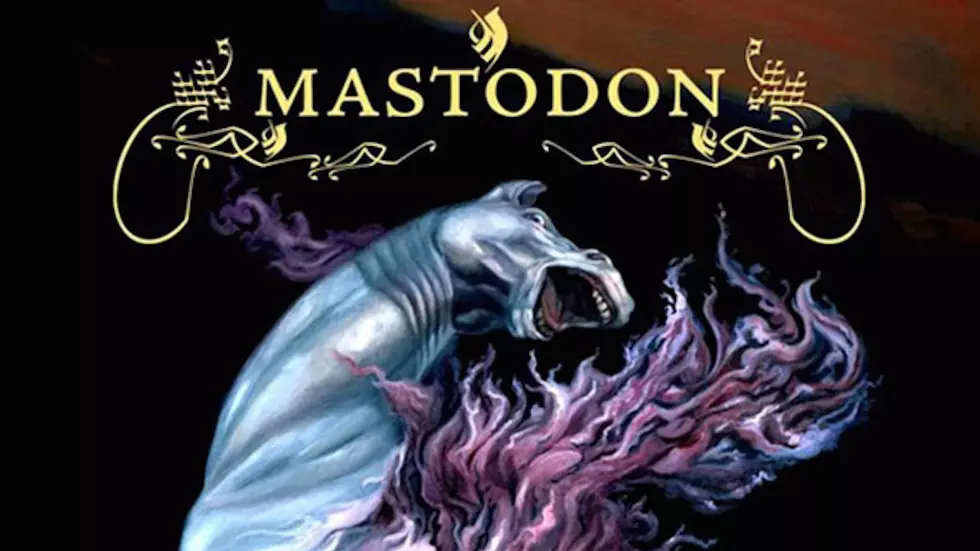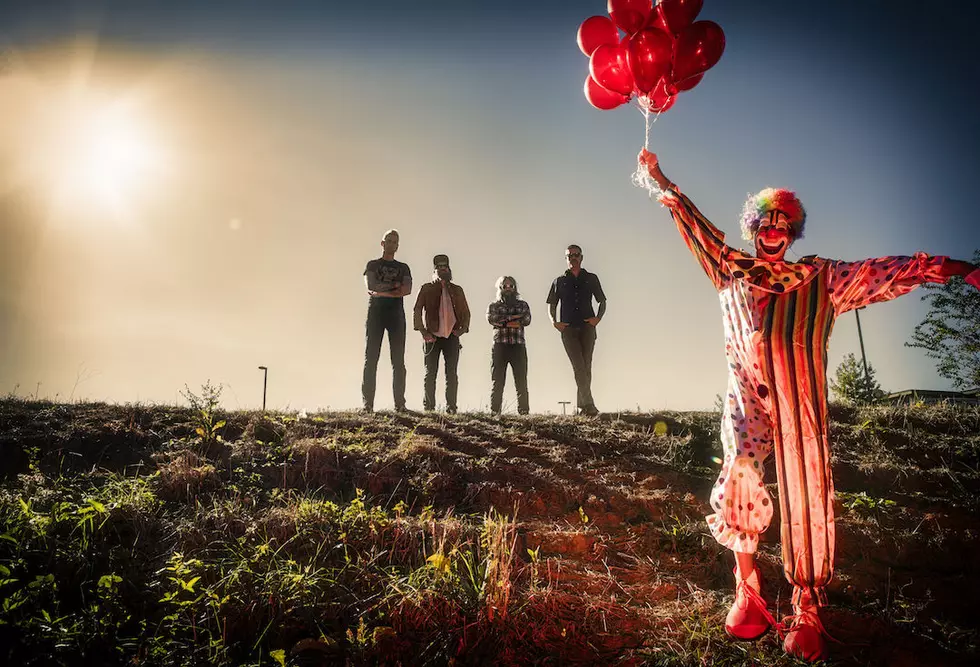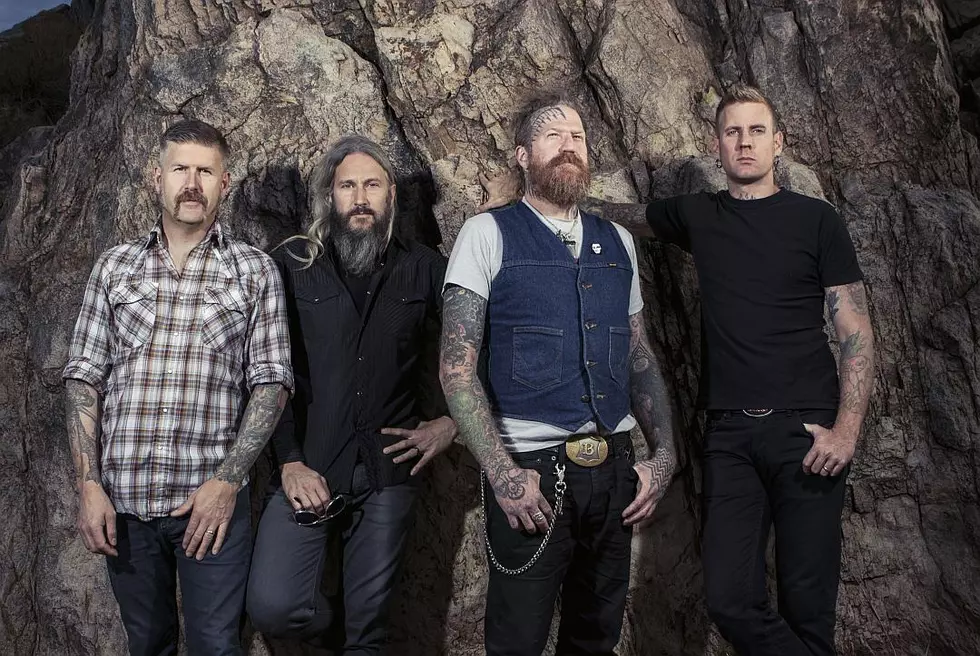
Enter ‘Sand’ Men: Mastodon Stand United Against the Void
“People never really talk about how happy they are,” Bill Kelliher proclaims one sunny afternoon in Austin. “They usually talk about how sad they are.” Coming from the Mastodon guitarist, this life lesson seems a bit strange; after all, the Atlanta all-stars built their career on riff-fueled ribaldry and grandiose tales of white whales, colonies of birchmen and Russian time travel. Coupled with their collective sense of humor and unparalleled instrumental chops, those literary smarts have made them one of the biggest bands in rock.
But their secret ingredient is rooted neither in cosmic truth nor music theory — it’s just called openness. “We tend to channel any and all emotions through this art that we call Mastodon,” bassist Troy Sanders declares in Warner Bros.’ Manhattan headquarters. He’s just polished off the Jägermeister dispenser in the interview room — a pitiful half-shot was all that remained — and is ready to bare all on Emperor of Sand, the group’s new concept record detailing a desert drifter’s battle with a vicious curse. While it’s largely a continuation of the group’s drift away from all-out aggro to melodic hard rock, the LP’s narrative-driven paradigms mark a return to form, rendering it a bridge between an old beast and a new monster — not to mention their best release in years.
Creatively speaking, it was Kelliher and drummer Brann Dailor who first set foot into the desert — they wrote roughly 70 percent of Emperor of Sand’s first single, “Sultan’s Curse,” in 2010, not long after 2009’s Rasputin-centric time travel opera Crack the Skye. Kelliher recalls the movie playing in Dailor’s mind as he listened to the galloping riffs and craggy backbeat: “He was like, ‘I really picture a Lawrence of Arabia, a dude riding on a horse through the desert.’” Later on, while browsing Instagram, Dailor came across the work of Alan “Medusawolf” Brown, a gothic surrealist with a penchant for painting desert-dwelling demigods, often draped in decadent cloaks and armor. It was just the aesthetic the band was searching for (not to mention, the artist — Medusawolf crafted Emperor of Sand’s cover art, another morbid portrait).
The band’s collective struggles with cancer provided another flashpoint for Emperor of Sand, as tragedy after tragedy struck over the album’s three-year gestation period. Sanders’ wife Jeza was diagnosed with breast cancer (she’s currently in remission); Dailor’s mother, meanwhile, underwent chemotherapy, the latest battle in her decades-long standoff with the disease. And then there was Kelliher’s mother Catherine, who perished after developing a brain tumor; the guitarist spent much of his time by her bedside with his laptop open, presiding over the new record while she slept in the hospital. “It was more of a distraction — trying to focus all that energy of despair and sadness into something that could be translated into a tangible work of art.”
In time, her surgeons became fans of the band. “We were talking with the doctors when she was about to have the operation — I had to go to South America to do a short tour while she had her surgery,” Kelliher recalls. “When I met her neurosurgeon, he was like, ‘So, you're in Mastodon? We had to look you guys up, and we were blasting some of the music while we had your mom's brain open.’” He laughs. “I think it was kind of fitting that they were playing Mastodon, and he's like [imitating doctor's voice], ‘Yeah, we had her brain open and had your music playing.’”
Mastodon’s heavy hearts didn’t hamper their individual or collective sessions; if anything, it amplified them, leaving them with 15 tracks’ worth of new material — “stacks of riffs,” as Kelliher puts it, subsequently and alternately “cut, pasted, kept and cannibalized.” In time, the four Mastodonians realized that, incredibly, their disparate material put them all on the same page. “When we had the 11 songs, we realized that the similarities running through them all were 11 pieces of a puzzle that we could piece together,” Sanders says. “Sometimes we're not aligned like that when writing lyrics — it can be more something along the lines of The Hunter or Once More 'Round the Sun.” In other words, the album’s narrative emerged organically. It's a remarkable modus operandi when you consider all its recurring thematic motifs: forbidden treasure, Mesoamerican mythology (jaguar gods, Nazca Lines) and, of course, a sultan’s curse.
Musicians are quick to describe their albums as musical offspring, and Mastodon are no different — which, of course, makes picking a favorite song difficult. Sanders prefers to take a look at the big picture. “I don't have a particular favorite record,” he says, “but I enjoy putting all eight albums on the floor and realizing this journey that began as four guys who all had the same intention of getting in a van and taking this music and playing it any place that would have us. It's grown into this adventure.”
Kelliher, however, is willing to name names, citing the soaring “Roots Remain” as his proudest moment on the album, not to mention the most personal. The song was originally named “Catherine the Great,” a nod to both the famed Russian empress and his own mother, who shares her name. “When I'm listening to the lyrics, I will never not think of her face when she was in hospice, and just kind of comatose, waiting to leave this world.” He quotes the chorus ("Beauty fades / death decays”), adding, “When I hear those words, I just think of her and how her face had changed, and how she was just wasting away, and I was hoping that she'd pass away quickly. It really pulls on the heartstrings.”
That the band could shoulder all this pain and bear a collective grin over the past few years — carving wooden penises, framing music videos as twerk-offs and the like — is remarkable, but also standard praxis for these rascals. “Should we write about some sort of adventure, some fun time, some roller coaster and cotton candy?" Sanders ponders, his voice momentarily dripping with fake awe. “No, we can't write things about that. We write what we know, and what we know is what we're experiencing and living, and we tend to pull from darkness and attempt to channel it through our art into some type of brightness.” He smiles. “We're optimists. We deal with our grief and our anger with this band, and we try to find some sort of light in all of the darkness. We're always trying for a happy ending.”
There’s no happy ending to speak of on Emperor of Sand. The album’s epic closer, “Jaguar God,” concludes with the protagonist coming face to face with the curse that’s prophesized to take his life: “It's right in front of me / The throne of maladies / It's right in front of me / Your malignancy.” The instruments express urgency and resilience, but the lyrics offer little in the way of closure. It’s just one man — or more accurately, four —against the void. And that’s where fans like you and me come in — like all myths, Emperor of Sand is a tale meant to be retold (or rather, replayed) again and again, so that we may all associate it with our own pains and find ourselves in its hero. The band is just its avatar.
According to Kelliher, “I'll get emails or posts on our Facebook page where kids are like, ‘My mom just went through the same shit, man. Like, I feel you. I know what you're going through. These songs have really helped me cope because I know that I have a friend or a person like you.’ Maybe we don't know each other, but now I know that we’re going through the same shit. It's cleansing, and it's good.”
More From CLRVYNT









